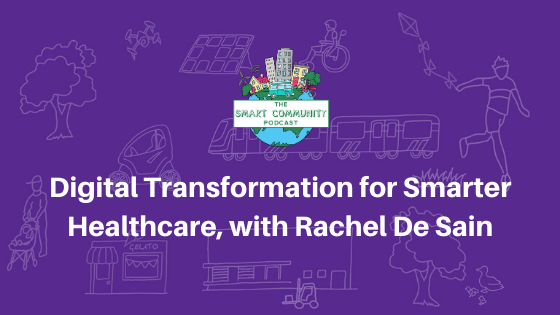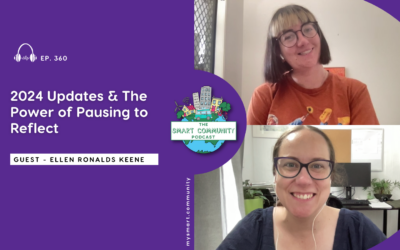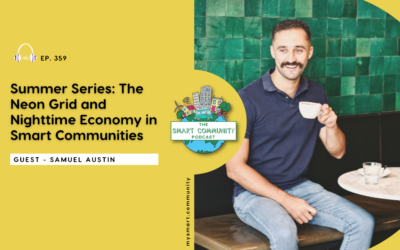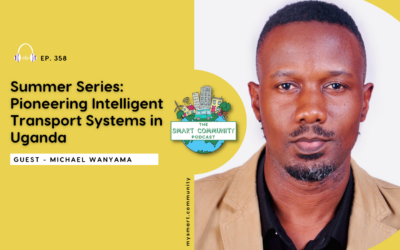In this episode I have a brilliant conversation with Rachel De Sain, Founder and lead Advisor at Codesain. Rachel tells us about her background across a range of digital transformation and innovation disciplines, and her passion for using technology to make healthcare better.
Rachel and I talk about what digital transformation really means—it’s not just making your paper forms into online forms!—and why it’s so important that we develop Smart concepts to really rethink how we deliver services to the community. Rachel shares with us some of the projects she’s currently working on, and why she moved out of Sydney to find more liveability regionally.
We have a really great conversation about the impacts of commuting on health and wellbeing, and why we should be focusing more on this and not just on the problem of congestion. We discuss how technology can help us fail in safer, faster ways and why we need governments that are more risk-tolerant to allow this iterative approach.
Rachel and I talk about how we can better integrate by of having a whole of government approach to data sharing to drive better, more efficient use of public investment and the use of life flow analyses to have a more citizencentric approach.
We finish our chat discussing the emerging trend of being interface agnostic when it comes to content, strategy and governance to facilitate accessibility, plus the wellbeing impacts of our always-connected world not just on our kids, but on the grown ups too.
As always, I hope you enjoyed listening to this episode as much as I enjoyed making it!
Listen here:
What we cover in this episode:
- Rachel’s background across a range of digital transformation and innovation disciplines, and her passion for using technology to make healthcare better
- What digital transformation really means—it’s not just making your paper forms into online forms!
- Why it’s so important that we develop Smart concepts to really rethink how we deliver services to the community
- How Rachel sees Australia currently embracing Smart concepts
- Projects Rachel is currently working one including national digital health projects
- Why Rachel moved out of Sydney to find more liveability regionally
- The impacts of commuting on health and wellbeing
- The reasons we should be focusing more on commuting, not just congestion
- Using behaviour change theories to help incentivise proactive healthy behaviours in situations like catching the train
- How technology can help us fail in safer, faster ways
- Why we need governments that are more risk-tolerant to allow this iterative approach
- How we can better integrate by having a whole of government approach to data sharing to drive better, more efficient use of public investment
- How we could make use of life low analyses to have a more citizen-centric approach
- The emerging trend of being interface-agnostic when it comes to content, strategy and governance to facilitate accessibility
- The wellbeing impacts of our always-connected world, not just on our kids but on the grown ups too.
Quotes:
“We have a sick-care system, it’s not about healthcare…Smart technologies create an incredible opportunity to transform our entire approach to healthcare into more of a predict and prevent [approach]…That’s really where my interest and passion to try and link those two areas together.”
“It’s okay to make money, it’s okay to have a viable and strong company. But let’s try and do it where it looks after the people that it serves and within it, but also the environment that it’s in, too.”
“[A Smart City] needs to be inclusive, and importantly, sustainable; tread lightly on the environment and ideally, maybe even undo some of the damage from the design and the use of cities from before we had the opportunity to make them Smart.”
“The world is changed, some things definitely for the better and it can be quite hard…we are facing some monumental challenges: over-population, urbanization, climate change. So, really rethinking how we design our cities, our communities, the way we interact with each other, in a Smarter way to support a different, better way of life that’s fairer, equitable etc. I don’t just think it’s important. I think it’s actually mandatory. It’s fundamental to a good future for all of us.”
“[We have a] need for a more open, more tolerant-to-risk, more tolerant-to-try-new-ideas kind of governments…But it feels like there’s a real barrier to being able to turn those ideas into things you could test and try in the market, obviously in a safe way. But I’m not sure that we have that sort of environment to test those ideas.”
“It is a huge cultural mindset shift for a lot of people, that celebration of failure, because we need to learn how to fail better, in all sorts of aspects of life. You are not going to be innovative if you don’t fall smack on your face and get things horribly wrong, and in fact, dust yourself off and say, awesome, I learned something.”
“We are in a really tremendously challenging political situation. But we need to be bolder, we need to take risks. And government needs to see itself as an enabler. And we need to be able to allow government to make some hard decisions. And also I think every single person—doesn’t matter whether you’re on the left or right or anywhere in between— needs to take a little bit of look in the mirror at the role that they play in that. We talked about government being so risk averse and not wanting to do things, yet the media hype cycle of the clickbait [means] that one teeny tiny little error, the government gets ripped a new one. We need to try and create the space for government to make some hard decisions and stick to them.”
“We need to be smarter about how we use data and mandate that public investment, regardless of what vertical it is: education, health, justice, environment etc. [Each vertical] needs to share that data in a way that enables cross-sector analysis and development of joint initiatives that are really going to drive us forward to a more equitable, sustainable and efficient economy.”
“We need to look at life flow analysis of somebody, so even something as simple as deciding to have a child, the process of getting pregnant etc. All the different touch points that you interact with, throughout that entire journey, are a multitude of government divisions. Yet we still have this silo-ed approach…we can use that citizen-centric life flow approach to find ways to ensure we’re sharing that data and keeping that person’s need at the forefront of what we’re doing.”
Links:
Netflix documentary Inside Bill’s Brain: Decoding Bill Gates
TV series Mindhunter
Connect:
Connect with Rachel via LinkedIn or at https://www.codesain.com.au/
Connect with me via email: hello@mysmart.community
Connect via LinkedIn, Twitter and Facebook @smartcommpod
The Smart Community Podcast is produced by Perk Digital.






0 Comments